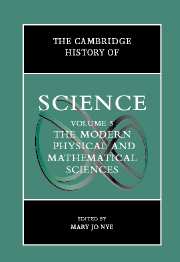Book contents
- Frontmatter
- Introduction: The Modern Physical and Mathematical Sciences
- Part I The Public Cultures of the Physical Sciences After 1800
- Part II Discipline Building in the Sciences: Places, Instruments, Communication
- Part III Chemistry and Physics: Problems Through the Early 1900s
- Part IV Atomic and Molecular Sciences in the Twentieth Century
- Part V Mathematics, Astronomy, and Cosmology Since the Eighteenth Century
- 23 The Geometrical Tradition: Mathematics, Space, and Reason in the Nineteenth Century
- 24 Between Rigor and Applications: Developments in the Concept of Function in Mathematical Analysis
- 25 Statistics and Physical Theories
- 26 Solar Science and Astrophysics
- 27 Cosmologies and Cosmogonies of Space and Time
- 28 The Physics and Chemistry of the Earth
- Part VI Problems and Promises at the End of the Twentieth Century
- Index
- References
27 - Cosmologies and Cosmogonies of Space and Time
from Part V - Mathematics, Astronomy, and Cosmology Since the Eighteenth Century
Published online by Cambridge University Press: 28 March 2008
- Frontmatter
- Introduction: The Modern Physical and Mathematical Sciences
- Part I The Public Cultures of the Physical Sciences After 1800
- Part II Discipline Building in the Sciences: Places, Instruments, Communication
- Part III Chemistry and Physics: Problems Through the Early 1900s
- Part IV Atomic and Molecular Sciences in the Twentieth Century
- Part V Mathematics, Astronomy, and Cosmology Since the Eighteenth Century
- 23 The Geometrical Tradition: Mathematics, Space, and Reason in the Nineteenth Century
- 24 Between Rigor and Applications: Developments in the Concept of Function in Mathematical Analysis
- 25 Statistics and Physical Theories
- 26 Solar Science and Astrophysics
- 27 Cosmologies and Cosmogonies of Space and Time
- 28 The Physics and Chemistry of the Earth
- Part VI Problems and Promises at the End of the Twentieth Century
- Index
- References
Summary
For over three millennia, cosmology had closer connections to myth, religion, and philosophy than to science. Cosmology as a branch of science has essentially been an invention of the twentieth century. Because modern cosmology is such a diverse field and has ties with so many adjacent scientific disciplines and communities (mathematics, physics, chemistry, and astronomy), it is not possible to write its history in a single chapter. Although there is no complete history of modern cosmology, there exist several partial histories that describe and analyze the main developments. The following account draws on these histories and presents some major contributions to the knowledge of the universe that emerged during the twentieth century. The chapter focuses on the scientific aspects of cosmology, rather than on those related to philosophy and theology.
THE NINETEENTH-CENTURY HERITAGE
Cosmology, the study of the structure and evolution of the world at large, scarcely existed as a recognized branch of science in the nineteenth century; and cosmogony, the study of the origin of the world, did even less. Yet there was, throughout the century, an interest, often of a speculative and philosophical kind, in these grand questions. According to the nebular hypothesis of Pierre-Simon de Laplace and William Herschel, some of the observed nebulae were protostellar clouds that would eventually condense and form stars and planets in a manner similar to the way in which the solar system was believed to have been formed. This widely accepted view implied that the world was not a fixed entity, but in a state of evolution.
- Type
- Chapter
- Information
- The Cambridge History of Science , pp. 522 - 537Publisher: Cambridge University PressPrint publication year: 2002

